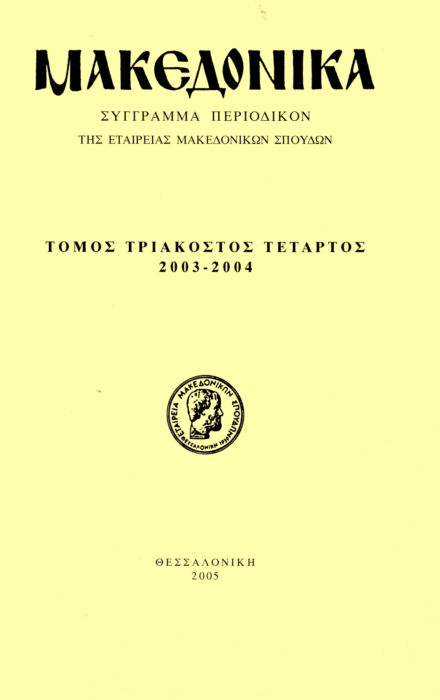Report by Georgios Tsorbatzoglou for the Genitsa Kazas in 1904
Abstract
In May 1904 the diplomat Georgios Tsorbatzoglou was sent by the Thessaloniki Consul E. Evgeniadis to review on site and prepare a written report regarding
current status in the areas of Veria, Naoussa, Vodena, Genitsa and Gevgeli, as Bulgarian propaganda was getting increasingly active in Macedonia.
The competition was mainly on education and religion, therefore Tsorbatzoglou pointed out the «intense activity of Hellenic education in the town of Giannitsa» and emphasized the building of a new school. The location of the building was the object of arguments between the two parties of the local Greek authorities. One was led by Christos Chatzidimitriou and the other by the physician I. Vlachos. This report contains interesting details about Genitsa in 1904. He wrote about the population composition: The Christian Orthodox households in the town are approximately 850 (each one inhabited by two families, that means an average of ten people). The Turkish ones are between 1.000-1.500. The Schismatic ones are 35 and the Unitic 15. The Bulgarian and Unitic propaganda were not successful due to lack of public support. He suggests, though, that the town needs an efficient Bishop, a Church Commissioner and well-educated preachers to take care of the religious and national awareness of the rural population, that was the target of the Bulgarian propaganda. The town was called Genitze Vardar or Genitze by the Turks and Pazar by the Slavians. The name was adapted to Giannitsa in 1926.
Article Details
- How to Cite
-
Τιμοθεάδης Τ. Ι. (2004). Report by Georgios Tsorbatzoglou for the Genitsa Kazas in 1904. Makedonika, 34(1), 359–376. https://doi.org/10.12681/makedonika.879
- Issue
- Vol. 34
- Section
- Articles

This work is licensed under a Creative Commons Attribution-NonCommercial-ShareAlike 4.0 International License.
Authors who publish with this journal agree to the following terms:
- Authors retain copyright and grant the journal right of first publication with the work simultaneously licensed under a Creative Commons Attribution Non-Commercial License that allows others to share the work with an acknowledgement of the work's authorship and initial publication in this journal.
- Authors are able to enter into separate, additional contractual arrangements for the non-exclusive distribution of the journal's published version of the work (e.g. post it to an institutional repository or publish it in a book), with an acknowledgement of its initial publication in this journal.
- Authors are permitted and encouraged to post their work online (preferably in institutional repositories or on their website) prior to and during the submission process, as it can lead to productive exchanges, as well as earlier and greater citation of published work (See The Effect of Open Access).



